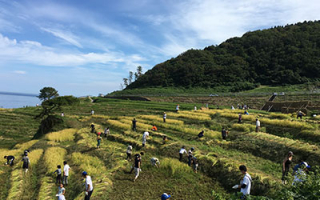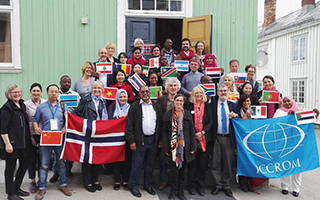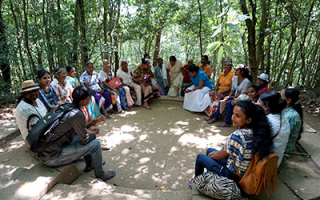This module is the largest in the WHL programme, and aims to set a new approach to managing World Heritage sites by recognising the interconnected biocultural character of natural, cultural, and social values, in the context of the wider heritage place.
All World Heritage sites carry values related to cultural and natural heritage, and thus management needs to acknowledge the interplay between the protection of Outstanding Universal Value (OUV) and all other levels of heritage significance (local, national or international) that may not necessarily meet the criteria for OUV.
Measures should be implemented to secure each site’s contribution to sustainable development, in accordance with the sustainable development policy adopted by the World Heritage Convention’s General Assembly in 2015, without undermining protection and conservation goals.
Local communities need to be engaged and empowered as actors for better conservation, and where relevant, have their rights recognized in relation to World Heritage properties.
Revision of management manuals
Work is underway on a draft management manual for World Heritage, which will integrate the existing manuals on Managing Natural World Heritage and Managing Cultural World Heritage.
Based on the systems used to administer diverse World Heritage properties, the manual will be a foundational resource for the management and conservation of World Heritage.
The first working draft of the manual, equipped with a full glossary, will be produced by the end of 2021.
Revision of Enhancing Our Heritage toolkit
Enhancing Our Heritage is a toolkit originally designed to assist with management effectiveness assessments at natural properties. Continuing on from the adaptation work conducted through the ICOMOS-IUCN Connecting Practice project, the toolkit is undergoing major revisions to make it applicable for cultural World Heritage sites as well.
The revisions are being implemented by the International Union for Conservation of Nature (IUCN) with generous funding provided by the Swiss Federal Office for Environment. The toolkit content will be fully aligned with the integrated management manual for World Heritage currently being drafted, allowing them to be used together.
We are working with a small number of sites worldwide on various testing activities, to verify if the changes to the toolkit are useful and applicable.
The toolkit revision will be completed in 2021.
Capacity building platform development
To improve the effectiveness of management at World Heritage Sites worldwide, the programme aims to produce relevant, integrated resource materials that are easily accessible. These will be hosted on a consolidated web platform dedicated to capacity building, which will be curated and shared between all partner organizations.
While the platform will promote World Heritage sites as flagships of best practice, its content – including principles, methods, and tools – will apply to the wider management of cultural and natural sites. New approaches will be tested in multiple regions and different languages through workshops, meetings and courses.
People Nature Culture
The People-Nature-Culture (PNC) course provides conservation practitioners with the necessary knowledge and tools to work more effectively with communities through existing management systems. It merges both the nature and culture sectors for a more holistic view of heritage conservation, while encouraging practitioners to consider people and local communities as a core component of heritage management, recognizing their strong contributions to the structuring values of the heritage site.
ICCROM has long recognised the importance of people-centred approaches, most recently within its programme Promoting People-Centred Approaches to Conservation (2011-2017). People-centred approaches are not only a question of increasing participation within a given management system. The approaches must also ensure that the people most connected to heritage are at the core of its conservation, while underlining the dynamic and mutually beneficial role of heritage in society.
To keep the course curriculum relevant to answering on-the-ground management issues, PNC courses are hosted at diverse World Heritage sites that collaborate with the World Heritage Leadership programme. World Heritage sites wishing to host the PNC course are welcome to contact us.



